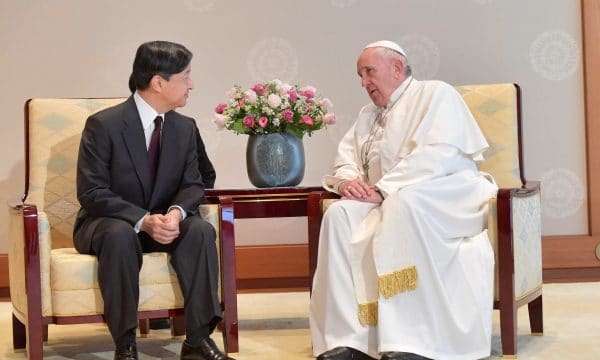
TOKYO (UCAN): “I am grateful in a special way to Emperor Naruhito for having received me this morning. I offer him my good wishes and I invoke God’s blessings on the Imperial Family and all the Japanese people at the beginning of the new era inaugurated by his reign.” Pope Francis said on November 25, the final day of his visit to Japan.
It was the new emperor’s second meeting with a pope after visiting Pope John Paul II at the Vatican in 1984 when he was crown prince.
Pope Francis revealed more about his lifelong passion for Japan, recounting to Emperor Naruhito how much his parents cried in 1945 when they learned about the atomic bombings of Hiroshima and Nagasaki when more than 100,000 people were instantly killed. The future pope was nine-years-old at the time.
The two also discussed the natural environment, which the pope said was related to the economy, one of the constant themes of both his papacy and his trip to Japan.
Information about the historic meeting was gained by Japanese journalists with connections to the imperial household and relayed to visiting media.
Japan has long been something of an obsession with Pope Francis, who was preparing to go to Japan from his native Argentina as a young Jesuit in his 20s when he was diagnosed with a lung ailment that put an end to his planned missionary work.
The Jesuits were the first Catholic order to go to Japan as missionaries in the 16th century.
On a busy final full day, the pope also had a private audience with the prime minister, Shinzo Abe, who recently became Japan’s longest-serving post-war leader. Abe had been pushing for a papal visit since the pope’s election in March 2013.
“The friendly relations existing between the Holy See and Japan are long-standing and rooted in the appreciation and admiration felt by the first missionaries for these lands. We have only to recall the words of the Jesuit Alessandro Valignano, who in 1579 wrote: ‘Whoever wishes to see what our Lord has bestowed upon man need only come to Japan to see it,’” Pope Francis said.
“Historically, many contacts and cultural and diplomatic missions have fostered this relationship and helped to surmount moments of tension and trouble. These contacts have gradually taken on institutional form, for the benefit of both parties, the pope said.
“I have come to confirm Japanese Catholics in their faith, their charitable outreach to those in need and their service to the country of which they are proud citizens. As a nation, Japan is particularly sensitive to the suffering of those less fortunate, the handicapped and the disabled,” he continued.
“The theme of my visit is Protect All Life in recognition of its inviolable dignity and the importance of showing solidarity and support to our brothers and sisters in any kind of need,” Pope Francis said, adding, “I have had a powerful experience of this in listening to the stories of those affected by the Triple Disaster, and was touched by the hardships that they have endured.”
Abe backed back Pope Francis’ call for a world free of nuclear weapons, a position the pontiff made forcefully at the atomic bombing sites in Nagasaki and Hiroshima on November 24.
“As the only country to have experienced the horror of nuclear devastation in war, Japan is a country with the mission of leading the international community’s efforts to bring about a world free of nuclear weapons. This is my steadfast belief and the firmly established principle of the Japanese government,” Abe said.
“We will continue to work to build a bridge between nuclear weapon states and non-nuclear weapon states. I declare here that we will be utterly tireless in our efforts to promote dialogue while obtaining cooperation from both sides,” the prime minister said.
“Your Holiness Pope Francis, for 70-plus years since the war, we in Japan have single-mindedly and unwaveringly pursued peace and freedom.
“It was the late Ogata Sadako, who served as United Nations high commissioner for refugees, who spread to the world the thinking that the most important thing is to strengthen each individual human being and enable each and every one to dream big for the future.
“Japan has continued to cultivate young people who believe this, and not only believe it but also demonstrate it through action,” Abe said.
After the meeting, Pope Francis addressed members of civil society and the diplomatic corps at the prime minister’s official residence.
Speaking of Japan’s cultural heritage, the pope pointed out that throughout many centuries Japan has been able to develop and preserve “the profound religious and moral values that characterise this ancient culture.”
He said that good relations between the different religions are not only essential for a future of peace, but for training present and future generations to cherish the ethical principles that serve as the foundation for a truly just and humane society.
Pope Francis expressed his gratitude for having been invited to visit Japan and encouraged all those present in their “efforts to shape a social order ever more protective of life, ever more respectful of the dignity and rights of each member of our human family.” Michael Sainsbury










